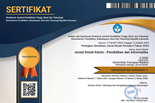Abstract
Abstrak Tujuan dilakukannya penelitian ini adalah untuk mengetahui: 1) pengaruh model experiential learning terhadap motivasi belajar siswa pada mata pelajaran simulasi digital; 2) pengaruh model experiential learning terhadap hasil belajar siswa pada mata pelajaran simulasi digital; 3)i keterlaksanaan model experiential learning terhadap motivasi dan hasil belajar siswa pada mata pelajaran simulasi digital; dan 4) respon siswa terhadap penggunaan model experiential learning pada mata pelajaran simulasi digital. Penelitian ini merupakan peneltian kuantitatif yang menggunakan Quasi Experimental Design dengan desain penelitian Nonequivalent Control Group Design. Pengambilan sampel pada penelitian ini menggunakan teknik nonprobability sampling dengan jenis sampel jenuh. Instrumen yang digunakan adalah angket motivasi pretest-posttest, tes hasil belajar pretest-posttest, lembar observasi aktivitas guru dan siswa, serta angket respon siswa. Berdasarkan hasil uji signifikan (uji-t) diperoleh nilai thitung sebesar 2,650 lebih dari ttabel sebesar 2,101. Sehingga dapat disimpulkan bahwa model experiential learning berpengaruh terhadap motivasi belajar siswa pada mata pelajaran simulasi digital. Berdasarkan hasil uji signifikan (uji-t) diperoleh nilai thitung sebesar 3,070 lebih dari ttabel sebesar 2,101. Sehingga dapat disimpulkan bahwa model experiential learning berpengaruh terhadap hasil belajar siswa pada mata pelajaran simulasi digital. Hasil observasi aktivias guru sebesar 81,65% dengan kategori sangat baik, aktivitas siswa sebesar 73,375% dengan kategori baik, dan angket respon diperoleh hasil 81,87% dengan kategori sangat baik. Kata-kata Kunci : model experiential learning, motivasi belajar, hasil belajar Abstract The objectives of this study are to know to effect: 1) the effect experiential learning model on students learning motivation in digital simulation subject; 2) the effect of experiential learning model on students learning outcomes in digital simulation subject; 3) e the feasibility of experiential learning model on students learning motivation and learning outcomes in digital simulation subject; 4)the students’ responses on the use of experiential learning model in digital simulation subject. This study is a quantitative research that uses Quasi Experimental Design with Nonequivalent Control Group Design as research design. Sampling in this study uses nonprobability sampling technique with a type of saturated sample, which means that all members of population are sampled. The instruments that used are pretest-posttest motivation questionnaire, pretest-posttest learning outcomes test, teacher and student activity observation sheet and students’ response questionnaire. Based on the results of significant test (t-test), it is obtained the value of tcount is 2,650 more than ttable is 2,101. Thus, it can be concluded that the experiential learning model has an effect on students learning motivation in digital simulation subject. Based on the results of significant test (t-test), it is obtained the value of tcount is 3,070 more than ttable is 2,101. Thus, it can be concluded that the experiential learning model has an effect on students learning outcomes in digital simulation subject. The results of teacher activity observation that is 81.65% with very good category, student activity that is 73.375% with good category, and from the calculation of response questionnaire, it is obtained the result of 81.87% with very good category.
Key words : experiential learning model, learning motivation, learning outcomes
References
DAFTAR PUSTAKA Keller, M. John. 2010. Motivational Design For Learning and Performance The ARCS Model Approach. London: Springer New York Dordrecht Heidelberg London.
Kolb, Alice Y & Kolb, David A. 2005. Learning Styles and Learning Spaces: Enhacing Experiential Learning in Higher Education. Vol. 4, No. 2 (2005) Kolb, David. 1984. Experiential Learning Experience As The Source Of Learning And Development. New York: International Inc Publishing. Musfiqon. 2012. Panduan Lengkap Metodologi Penelitian Pendidikan. Jakarta: Prestasi Pustaka Publisher Sugiyono, 2013. Statistika Untuk Penelitian. Bandung: Penerbit Alfabeta. Sugiyono. 2014. Metode Penelitian Pendidikan Pendekatan Kuantitatif, Kualitatif, dan R&D. Bandung: Penerbit Alfabeta.
Copyright (c) 2019 Kholifatul Fithriyah, Muchamad Arif, Puji Rahayu Ningsih

 J. Ilm. Edutic is licensed under a Creative Commons Attribution 4.0 International License.
J. Ilm. Edutic is licensed under a Creative Commons Attribution 4.0 International License. 














